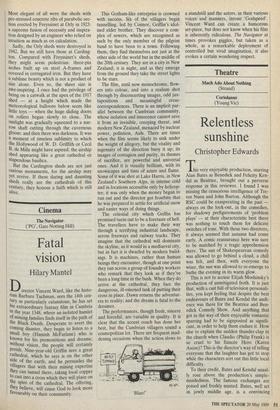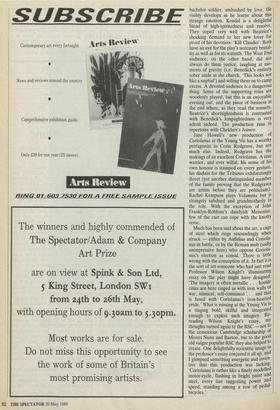Theatre
Much Ado About Nothing (Strand)
Corlolanus (Young Vic)
Relentless sunshine
Christopher Edwards
his very enjoyable production, starring Alan Bates as Benedick and Felicity Ken- dal as Beatrice, brought out a perverse response in this reviewer. I found I was missing the censorious intelligence of Tre- vor Nunn and John Barton. Although the RSC could be exasperating in the past always on the look-out, in the comedies, for shadowy prefigurements of 'problem plays' — at their characteristic best there was nothing to touch them for delicate switches of tone. With those two directors, it always seemed that autumn had come early. A comic reassurance here was sure to be matched by a tragic apprehension there. The sun of Shakespearean comedy was allowed to go behind a cloud, a chill was felt, and then, with everyone the wiser, the sun was allowed to re-emerge to bathe the evening in its warm glow.
This is not to accuse Elijah Moshinsky's production of unmitigated froth. It is just that, with a cast full of television personali- ties, you kept feeling that despite the best endeavours of Bates and Kendal the audi- ence was there for the Beatrice and Ben- edick Comedy Show. And anything that got in the way-of their enjoyable romantic sparring had to be signposted as signifi- cant, in order to help them endure it. How else to explain the sudden thunder-clap in the church when Claudio (Philip Frank) is so cruel to his fiancée Hero (Karen Ascoe)? This is the director's way of telling everyone that the laughter has got to stop while the characters sort out this little local difficulty.
To their credit, Bates and Kendal usual- ly rose above the production's simple- mindedness. The famous exchanges are poised and freshly minted. Bates, well set in jowly middle age, is a convincing bachelor soldier, ambushed by love. He visibly develops as he learns about this strange emotion. Kendal is a delightful blend of high-spiritedness and resolve. They coped very well with Beatrice's shocking demand to her new lover for proof of his devotion: 'Kill Claudio'. Both have an eye for the play's necessary brutal- ity as well as for its warmth. The West End audience, on the other hand, did not always do them justice, laughing at mo- ments of gravity (i.e. Benedick's entirely sober aside at the church, 'This looks not like a nuptial') and willing them on to camp excess. A devoted audience is a dangerous thing. Some of the supporting roles are woodenly played, but this is an enjoyable evening out, and the piece of business at the end where, as they read the sonnets, Beatrice's shortsightedness is contrasted with Benedick's longsightedness is very adroit indeed. The production runs in repertoire with Chekhov's Ivanov. Jane Howell's new production of Coriolanus at the Young Vic has a worthy protagonist in Corin Redgrave, but not much else. Indeed, Redgrave has the makings of an excellent Coriolanus. A true warrior, and ever wilful, his sense of his own honour is stamped on every gesture, his disdain for the Tribunes exhilaratingly direct (yet another distinguished member of the family proving that the Redgraves are artists before they are politicians). Rachel Kempson plays Volumnia but is strangely subdued and grandmotherly in the role. With the exception of John Franklyn-Robbins's dandyish Menenius, few Of the cast can cope with the knotty verse.
Much has been said about the set, a cage of steel which rings resoundingly when struck — either by Aufidius and Coriola- nus in battle, or by the Roman mob (sadly unimpressive here) who oppose Coriola- nus's election as consul. There is little wrong with the conception of it. In fact it is the sort of set someone who had just read Professor Wilson Knight's illuminating essay on the play might have designed: `The imagery is often metallic . . . hostile cities are here ringed as with iron walls of war, inimical, self-contained . and that is fused with Coriolanus's iron-hearted pride.' What is missing at the Young Vic is a staging bold, skilful and integrated enough to exploit such imagery. Re- reading Wilson Knight's essay, my thoughts turned again to the RSC — not to the censorious Cambridge scholarship of Messrs Nunn and Barton, but to the good old vulgar populist RSC they also helped to create. One delightfully eccentric image in the professor's essay conjured it all up, and I glimpsed something energetic and inven- tive that this production was lacking: `Coriolanus is rather like a finely modelled motor-cycle, flashing in bright paint and steel, every line suggesting power and speed, standing among a row of pedal" bicycles.'



































































 Previous page
Previous page